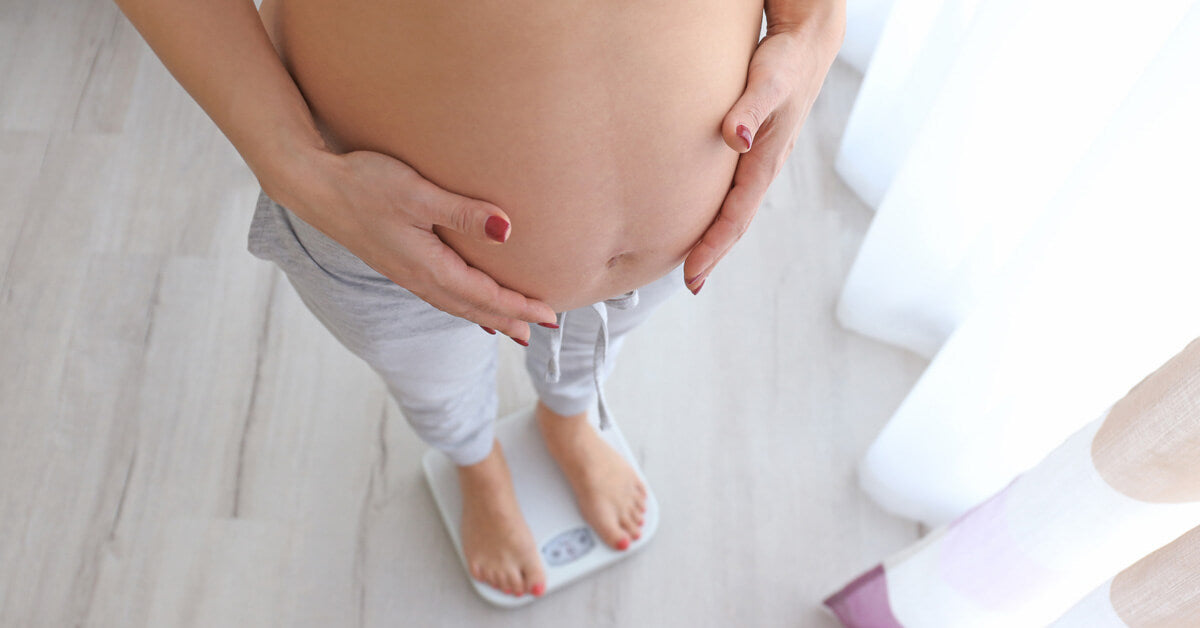
Your Guide To Pregnancy Weight Gain
Weight gain can be a tricky subject to tackle during pregnancy. From surviving morning sickness, to dealing with cravings and aversions, to satisfying the seemingly never-ending hunger, gaining the ideal amount of weight during pregnancy can be a difficult task.Weight gain can be a tricky subject to tackle during pregnancy. From surviving morning sickness, to dealing with cravings and aversions, to satisfying the seemingly never-ending hunger, gaining the ideal amount of weight during pregnancy can be a difficult task. A new government recommendation from the U.S. Preventive Services Task Force calls for doctors and clinicians to do more for women in terms of guidance when it comes to managing pregnancy weight.
These new government recommendations shift the responsibility from pregnant women back to their doctors and healthcare providers, who should provide adequate nutrition counseling and guidance throughout the entire pregnancy. Many healthcare professionals don’t have thorough training in diet and nutrition, so it’s important for doctors to be educated on the topic of pregnancy weight gain and how to avoid excessive weight gain, which can lead to dangerous consequences for both mothers and their babies.
How much weight should a woman gain during pregnancy? For the average woman, the recommended weight gain is between 25 and 35 pounds. For overweight or obese women, the recommended weight gain is closer to 20 to 25 pounds. These recommendations are flexible, and depend on a number of factors such as pregnancy complications, prior health issues, and how many babies the mother is carrying.
Not gaining enough weight during pregnancy can lead to babies with low birth weights. Gaining too much weight can lead to higher chances of developing preeclampsia, gestational diabetes, hypertension, birth defects, and even miscarriage and stillbirth.
Even though these ranges of recommended weight gain exist, there isn’t a one-size-fits-all answer when it comes to the ideal pregnancy weight. What doctors and clinicians can do is create individualized plans for each patient, giving them access to nutrition counseling, health coaches, dieticians, and fitness specialists. Instead of referring to a woman’s weight gain in casual, oftentimes confusing ways, doctors should be trained to give women concrete advice on how much to exercise, how to prevent excessive weight gain, and how to maintain good nutrition during pregnancy. Many doctors simply weigh pregnant women at each appointment, tell them whether they’ve gained too much or too little, and then move on with the appointment without giving adequate nutrition counseling.
How can you maintain a healthy pregnancy, without obsessing over the number on the scale?
1. Eat a balanced diet.
Pregnant women need to nourish their bodies with enough vitamins and nutrients to ensure that their babies grow properly in the womb. Women also need to eat a healthy diet so their bodies can have an easier time dealing with all the physical changes that pregnancy brings! Aim for five servings of fruits and vegetables per day, eat carbohydrate-rich foods which can provide energy, and focus on quality proteins such as lean meats, eggs, beans, and nuts. Eat calcium-rich foods such as cheese, yogurt, fortified plant milk, broccoli, cabbage, and beans. Because of increased blood volume, women will also need more iron during pregnancy, which can be found in foods like beans, egg yolk, salmon, dried fruit, whole grains, and peas. Avoid greasy, fatty foods that are high in calories and low on nutrient density - although giving into your cravings every now and then is completely okay!
2. Eat more, but not for two!
Just because you’re growing a whole new human, don’t expect that your baby requires as many calories as you do! Your growing baby is tiny for much of the pregnancy, so simply doubling what you normally eat isn’t a wise solution. Pregnant women do need more calories than the average person, but only a couple hundred per day. Choose an extra snack, add more protein at mealtimes, or make yourself a smoothie between meals. In the first trimester, you don’t need to eat more than usual, especially if you’re feeling ill. In the second and third trimesters, pregnant women are encouraged to consume approximately 300-500 more calories per day than their pre-pregnancy diet.
3. Exercise for at least 30 minutes a day.
Pregnant women should aim to exercise for 30 minutes a day, 5 days a week. Low impact exercises are safe for pregnancy. These include walking, swimming, yoga, pilates, stationary bikes, low impact aerobics, and strength training. Exercising during pregnancy helps prepare the mind and body for labor, reduces the risk of pregnancy complications such as preeclampsia or gestational diabetes, reduces the risk of having an emergency C-section, helps reduce stress, and helps alleviate some common aches and pains throughout the pregnancy. If you participated in high-impact, high-intensity exercise prior to pregnancy, it is sometimes safe to continue these activities during pregnancy. Just be sure to talk with your doctor first before making any significant changes to your exercise routine. Activities that should be avoided during pregnancy are ones that involve lying flat on your back, activities where your stomach might be hit, exercising at a high altitude, and doing activities that raise your body temperature too much. As your body changes throughout the pregnancy, your balance and breathing might change. Go easy on yourself, and adjust your workout routine to suit your needs.
4. Focus on overall health, both during and after pregnancy.
It takes nine months to grow a baby, and it often takes just as long (if not longer) to lose the pregnancy weight. Excessive pregnancy weight gain can make it harder to lose the weight postpartum. If you are pregnant, focus on setting yourself up both for a healthy pregnancy and a healthy postpartum journey. If you maintain good eating and exercise habits during pregnancy, it will be easier to continue these habits after you have your baby.
When it comes to pregnancy weight gain, there isn’t a one-size-fits-all answer for everyone. Some women need to gain more weight than others, while other women might struggle to gain enough weight during pregnancy due to complications. The important thing to focus on is making a health and nutrition plan with your doctor who knows your health history and pregnancy risks, and working towards maintaining a balanced routine of eating a nutritious diet and exercising regularly throughout the pregnancy.
Do remember to follow us on Instagram @keababies and join our loving and supportive KeaCommunity Facebook Group!
Parenting is awesome. Sleep is overrated. Every day is an adventure.
|
|
Meet Our KeaMommy Contributor: Kaitlyn Torrez I’m Kaitlyn Torrez, from the San Francisco Bay Area. I live with my husband and two children, Roman and Logan. I’m a former preschool teacher, currently enjoying being a stay at home mom. I love all things writing, coffee, and chocolate. In my free time, I enjoy reading, blogging, and working out. |




























































